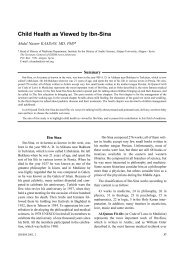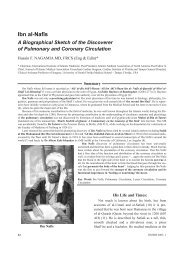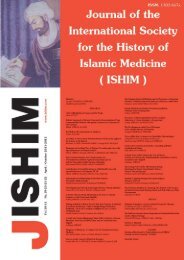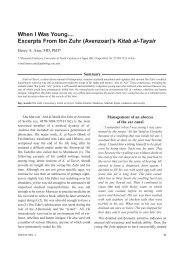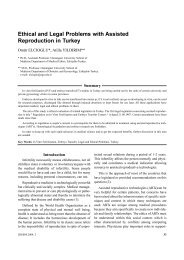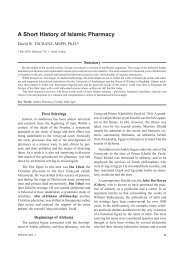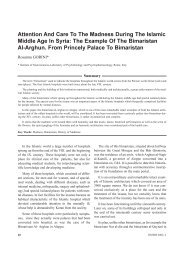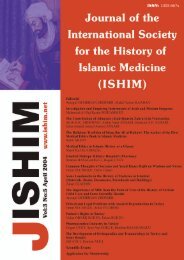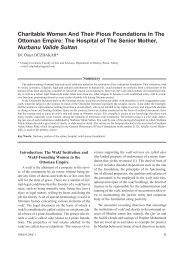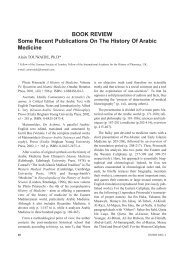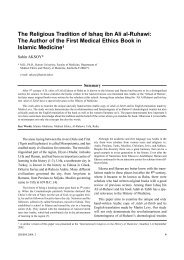Islamic Medicine History and Current Practice - International Society ...
Islamic Medicine History and Current Practice - International Society ...
Islamic Medicine History and Current Practice - International Society ...
- No tags were found...
You also want an ePaper? Increase the reach of your titles
YUMPU automatically turns print PDFs into web optimized ePapers that Google loves.
Husain F. NAGAMIAISLAMIC MEDICINE HISTORY AND CURRENT PRACTICE<strong>and</strong> analytical <strong>Islamic</strong> <strong>Medicine</strong>. Ibn Khaldun (1332-1406 AD) a well known medieval Muslim jurist, historian,statesman in his ‘Muqaddimah’ states:‘The Bedouins in their culture, have a kind of medicinewhich they base primarily on experience restrictedto a few patients only, <strong>and</strong> which they have inheritedfrom their tribal leaders <strong>and</strong> old women. In somecases it is correct, but it is not founded on naturallaws, nor is it tested against (scientific accounts) naturalconstitution (of peoples). Now the Arabs had agreat deal of this type of <strong>Medicine</strong> before the advent ofIslam <strong>and</strong> there were among them well known doctorslike al-Harith ibn Kalada <strong>and</strong> others. Their <strong>Medicine</strong>that has been transmitted in the <strong>Islamic</strong> religiousworks (as opposed to those works which were consideredscientific works) belong to this genre. It is definitelyno part of divine revelation (to the Prophet:Mohammed) but was something customarily practicedby the Arabs. This type of <strong>Medicine</strong> thus is included inhis biographies, just as are other multitudinous of mattersof sociological importance like the natural life <strong>and</strong>customs of the Arabs, but forms no part of religion ofIslam to be practiced in the same way.’Definition<strong>Islamic</strong> <strong>Medicine</strong> in its true context, can thus bedefined as a body of knowledge of <strong>Medicine</strong> that wasinherited by the Muslims in the early phase of <strong>Islamic</strong><strong>History</strong> (40-247 AH/661 -861 AD) from mostlyGreek sources, but to which became added medicalknowledge from, Persia, Syria, India <strong>and</strong> Byzantine.This knowledge was not only to become translatedinto Arabic, the literary <strong>and</strong> scientific lingua franca ofthe time, but was to be expounded, assimilated,exhaustively added to <strong>and</strong> subsequently codified, <strong>and</strong>‘islamicized’. The Physicians of the times bothMuslim <strong>and</strong> non-Muslim were then to add to this,their own observations <strong>and</strong> experimentation <strong>and</strong> convertit into a flourishing <strong>and</strong> practical science, thushelping in not only in curing the ailments of themasses, but increasing their st<strong>and</strong>ards of health. Theeffects of its domineering influence extending notonly in the vast stretches of the <strong>Islamic</strong> l<strong>and</strong>s, but alsoin all adjoining nations including Europe, Asia,China, <strong>and</strong> the Far East. The span was measurablenot only for few centuries, but also perhaps for anentire millennium, 610 to 1610 AD. During whichtime, Europe <strong>and</strong> rest of the extant civilized nationsof the world were in grips of the ‘dark ages’. It alsoto set the st<strong>and</strong>ards of hygiene, <strong>and</strong> preventativemedicine <strong>and</strong> thus was responsible for the improvementof the general health of the masses. It was tohold sway until decadence finally set in, concomitantwith the political decline of the <strong>Islamic</strong> nation. Withthe advent of Renaissance in Europe, at the beginningof the 17 th century AD, it was finally challenged bythe new <strong>and</strong> emerging science of modern medicine,which was to finally replace it in most of the countries,including the countries of its birth!Historical BackgroundIn order to underst<strong>and</strong> the period in which <strong>Islamic</strong>medicine was born, one has to underst<strong>and</strong> the salientevents in the advent of Islam <strong>and</strong> a few events justpreceding the <strong>Islamic</strong> era. Arabia which was a largearea covered mostly by an arid desert that wasroamed by nomadic tribes of Bedouins. Certain communitieshad been established where the trade routesintersected <strong>and</strong> water was available. Mecca wasalong the Yaman-Damascus trade route. It was considereda holy city <strong>and</strong> a sanctuary. The Kaaba orhouse of worship was replete with idols of differentgods each representing a tribe or community. TheseBedouins had their own tribal moral or ethical codesof conduct <strong>and</strong> idolatry was in practice. Blood feudswere common <strong>and</strong> attacking caravans along traderoutes was a way of life. Sacrifices were often offeredto appease the gods <strong>and</strong> burying of live female childrenwas common practice. Family feuds were common<strong>and</strong> settling scores in order to uphold tribalhonor led to frequent bloody encounters in whichmany people were killed. Women <strong>and</strong> children weretreated as ‘chattels’ or private possessions <strong>and</strong>became the property of the winner. This era of Arabiais frequently referred by Muslims as ‘Jahilliya’ orage of ignorance. Islam was not only to bring dramaticchanges in the religious practices of these warringnomadic tribes but also unite them into an unprecedentedsocial <strong>and</strong> cultural nation that very quicklywas to develop into a strong political entity, with itsown system of administration, justice, <strong>and</strong> militarypower, all under one leadership. The first leader ofthe <strong>Islamic</strong> State was no doubt the Prophet of Islam,20 JISHIM 2003, 2



